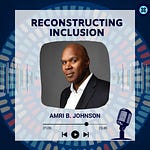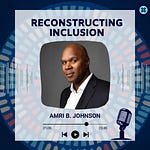In celebration of Black History Month, I urge all of us to integrate Black History teachings into our daily lives. To learn about Black, African, and African-American history, not only during this month, but throughout the year.
I recently came across a post responding to criticisms that DEI initiatives lower standards. In my opinion, this notion is misguided and indicative of a form of “Affinity Sclerosis”, a term I coined to describe the hardening of ideological positions.
DEI is about creating an environment for individuals to thrive, rather than justifying the course by righting past wrongs. People need to start adopting a heterodox view of DEI, and to be open to being influenced by the so-called “other”. This approach can prevent “Affinity Sclerosis”, and we can all be deliberate in seeking out disconfirmation of our ideas and firm beliefs.
We need to go beyond representation and focus on creating conditions for people to thrive because this is what real inclusion is all about.
I hope this was helpful. . . Make it a great day! ✌🏿
In this episode of the ‘Reconstructing Inclusion’ podcast, I had a chance to engage in an enlightening conversation with my mother, Dr. Harriett D. Johnson, bringing out profound narratives about her life, family history, experiences, and take on DEI, and professional journey as an educator. We touched on the impact of history on current diversity and inclusion practices, based on her experiences growing up.











